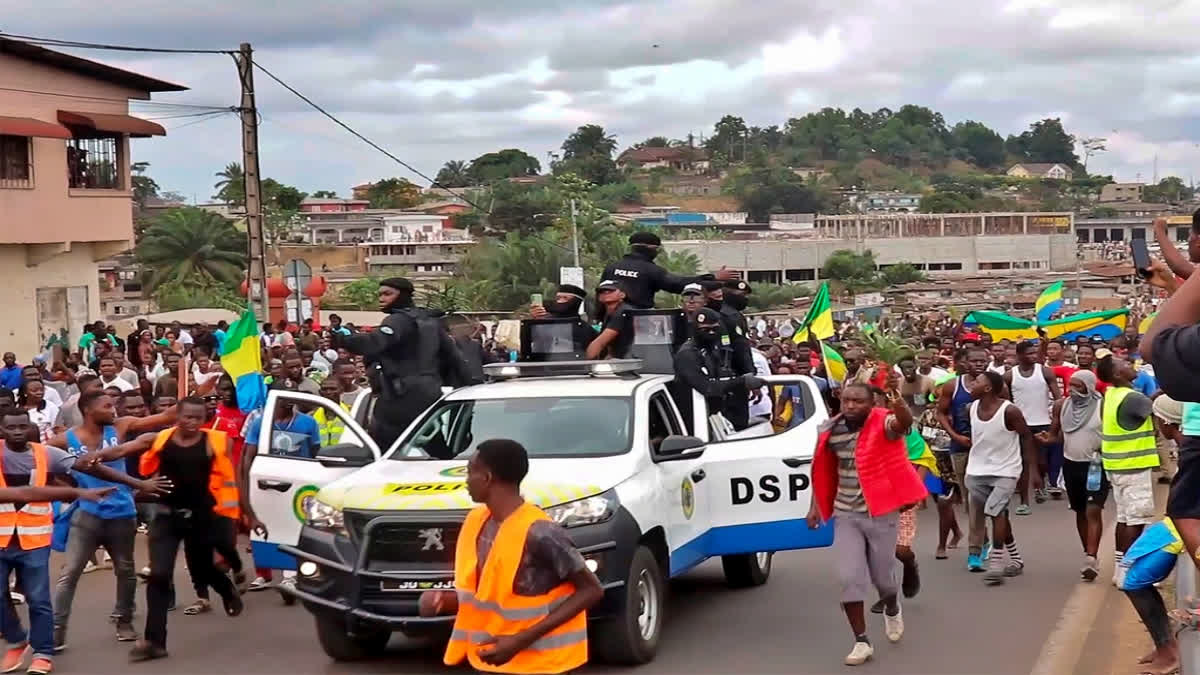New Delhi: The coup in Gabon in which the military ousted President Ali Bongo Ondimba will raise concerns in New Delhi as India has high stakes in the central African country on the Atlantic coast.
Mutinous soldiers seized power in Gabon on Wednesday and put President Ali Bongo under house arrest, hours after he was declared winner in an election extending his family’s 55-year rule in the oil-rich country. Ali Bongo has faced accusations of election fraud and corruption since he began ruling the oil-rich but poverty-stricken nation in 2009 after the death of his father who had ruled for 41 years. Following the coup, residents in the country’s capital were seen celebrating and embracing soldiers on the street. Army officers who seized power in the coup named General Brice Oligui Nguema as the West African state’s transitional leader.
Gabon is the latest country in Africa where a coup d’etat has been successful in recent years. Many of the countries in the west and central Africa are former French colonies. In 2020, Mali’s government fell after a coup d’etat. In 2021, successful coups’ d’etat took place in Sudan, Chad and Guinea. Last year, the government in Burkina Faso fell after a coup d’etat. Niger was seen as a bulwark against the high instability in the region but then the democratically-elected government there fell last month. And now, Gabon.
Also read:Coup in Gabon: Soldiers detain President Ali Bongo Ondimba whose family ruled for 55 years
Following the coup in Niger last month, New Delhi managed to help evacuate the few Indians in that West African nation numbering around 200-250. But this time, in Gabon, the task of evacuation will be tougher.
"In Gabon, much more diplomatic work will be needed (for evacuation) compared to Niger," Abhishek Mishra, Associate Fellow in the Manohar Parrikar Institute of Defence Studies and Analyses and who specialises on Africa, told ETV Bharat. "There are a large number of Indian companies operating there."
Over the last two decades, many Indian companies have invested in Gabon. Oil India Ltd. (OIL), in partnership with Indian Oil Corporation Ltd. (IOCL), is conducting oil exploration in the Shakti Block, which has an area of 3,761 sq km. as of Sept. 30, 2021, the consortium has invested $157 million in Gabon.
In 2010, Bharti Airtel acquired Zain Communications Network. Around 54 Indian companies are said to be operating out of the Special Economic Zone NKOK. The majority of Indian companies are working in veneer manufacturing, pharmaceuticals, travel agencies, trade of FMCG goods etc. Gabon has also become an attractive investment destination for the wood industry in recent years.
“Indian companies have invested in infrastructure development projects like affordable housing,” Mishra said. “India also tried to play a role in upgrading news broadcasting facilities in Gabon.”
However, the implementation/utilisation of the Lines of Credit (LoCs) from India has not seen much success in Gabon. In March 2007, the Government of India approved a LoC of $14.5 million for a housing project in Bikele near Libreville to construct 300 houses and four amenities. The project got stalled due to differences between the Government of Gabon and the Indian consortium engaged for the project on issues such as release of funds, grant of visa/residence permit to Indian workers, etc. Exim Bank had released $4.35 million for this project. The Government of Gabon later repaid the amount drawn and interest thereon.
India extended another LoC worth $67.19 million in 2011 to rehabilitate and upgrade the news broadcasting facilities of Gabon. However, due to non-utilisation of the LoC, it was finally annulled in December 2017. Currently, there is no active LoC to Gabon.
However, as part of New Delhi’s engagement with Africa, India has been involved in other development projects in Gabon. In September 2018, the Government of India announced a grant aid of $1 million for Gabon’s project for strengthening climate information and early warning systems, under the India-UN Development Partnership Fund. Gabon was among the first 15 African countries to implement the pan-African e-network project. Tele-education, Telemedicine and VVIP connectivity have been set up in Gabon’s capital Libreville under this project.
“In Gabon, we (India) also focus on agriculture, manufacturing and technical consultancy,” Mishra said. But in light of the coup on Wednesday, many of these projects face an uncertain future.
Interestingly, like in Niger, many citizens in Gabon came out in support of the coup leaders. “Many West African nations feel that the presence of French troops has not entirely ended decolonisation,” Mishra explained. “It is the root cause of insecurity among these countries. The people in these countries don’t trust their leaders. They want presidential term limits. Many see these coups as a decolonisation process.”
